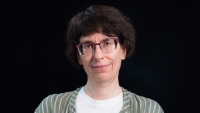When anything happened, people turned to students, viewing their opinions as some kind of promise
Zuzana Mistríková was born on May 21, 1967, in Martin, but grew up in Bratislava. She studied film and theatre dramaturgy at the Academy of Performing Arts, where she was also during the Velvet Revolution. From the beginning, she joined the student activist movement and co-founded the Coordination Committee of Slovak Universities. On 24 November 1989, as a student movement representative, she appeared in the TV Dialogue Studio in a discussion with representatives of the Communist Party. In the first free elections in June 1990, she was elected as a deputy of VPN to the Slovak National Council (SNR), when she was only 23 years old. In 1992, she retired from active politics, co-founded Fun Radio and co-founded the Association of Independent Broadcasts. She is currently a film producer and president of the Association of Independent Producers in Slovakia.
